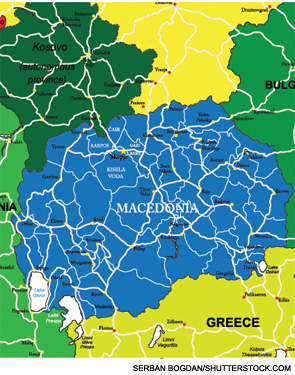
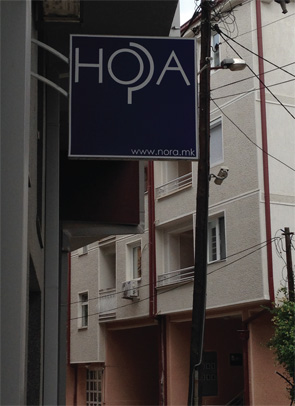
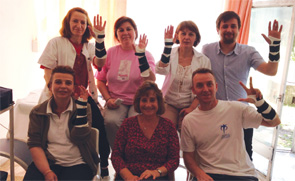
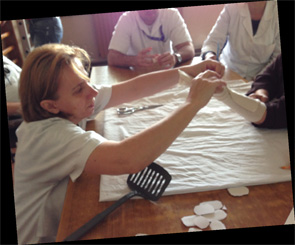
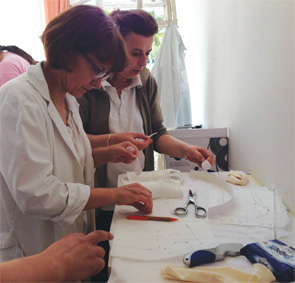
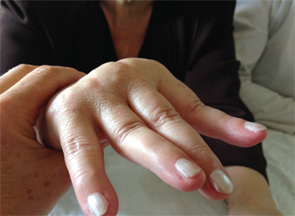
It has been a long-time goal of the University of Michigan Hospital and Health Systems to assist in the education and training of health professionals in less developed countries. In fall 2009, I traveled for the first time to the Republic of Macedonia with two rheumatologists and one pediatrician from the University of Michigan, sponsored partially by M GlobalReach and an ILAR grant awarded to one of the physicians. In spring 2014, we returned as a team of four, invited by the Macedonian Minister of Health to further train physicians and therapists caring for patients with rheumatic diseases.
The Need
As with many developing countries, Macedonia has significantly limited physical and financial resources for healthcare. Medicine is socialized for the most part, with citizens relying on the government for their healthcare needs. The government doles out resources, but funding is inadequate to meet the need in many areas. Much of what we consider routine care in the U.S. is nonexistent for many.
Actual medical intervention in regard to treatment of rheumatoid arthritis (RA) is improving, but it’s still many years behind the norm in more developed countries. Patients have very limited access to biologics, because they are far too expensive, but they do have methotrexate and medications for triple-line therapy. The physicians I traveled with trained their counterparts in maximizing treatment options with available medications.
Although Macedonia has many physical therapists, there are only a few trained occupational therapists—none practicing in the specialization of hand therapy. The approach to therapy is hands on, with a manual approach. There is minimal equipment available to be used with patient care and, in some cases, old and outdated technology with regard to modalities.
My goal was to introduce what orthotic management had to offer both adult and pediatric patients in the prevention of deformities and enhancement of function, and then train therapists in each clinic. There are no materials for custom low-temperature orthotic fabrication, and for this reason we brought some basic supplies with us from the U.S.
The Work
I visited two clinics. The first was in the capital of Skopje, and the second in Bitola. Patients consisted mostly of adults and children with RA, some acquired hand injuries and congenital conditions, such as cerebral palsy. Many of the RA patients had severe hand and wrist deformities that are generally no longer seen in the U.S. because of the improvement in medical management over the past 25 years. Many deformities were quite challenging and limiting in regard to function—not to mention pain—for several patients. For me, knowing that much of what I was seeing was avoidable in the developed world was particularly sad.
Together with therapists, patients were seen to determine if a hand orthotic would enhance functional hand use or prevent further deformities. I educated therapists on what I was seeing and what orthotic management had to offer. They watched me fabricate orthoses and then, with my help, learned and practiced each step until they could fabricate them independently.
Language was often a barrier, but fortunately for me there was usually at least one person who spoke and understood English reasonably well.
In addition to the fabrication workshop, we spent time in didactic teaching in the various types of low-temperature orthotics we fabricate as hand therapists and the conditions in which they are used in therapy and postoperative protocols.
Patient Advocacy
On the last day of my visit, I was invited to meet with the staff from the country’s patient advocacy foundation, NORA. They are passionate in acquiring additional funding and resources for people in their country with rheumatic diseases. We talked, sharing common challenges and stories. I shared several lectures that I have utilized in the past for public educational forums.
It’s my hope that I’ll be given the opportunity to return, so I can plan and participate in a public educational forum to have an even greater impact on improving life for those with arthritis in Macedonia.
Carole Dodge, OT, CHT, graduated from Boston University in 1979 with her Bachelor of Science degree in occupational therapy and earned her credential as a certified hand therapist in 2007. She has been employed at the University of Michigan Hospital and Health Systems in the Department of Physical Medicine since 1997, and currently has both clinical and managerial responsibilities for three outpatient hand therapy clinics. Her areas of specialty include rheumatoid arthritis and osteoarthritis, scleroderma, joint replacements and traumatic hand injuries.